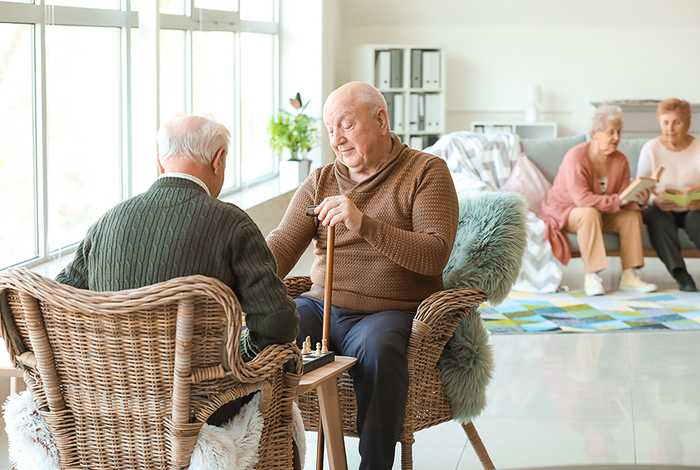Posted by Janine Griffiths
Advantages and disadvantages of home care for the elderly

Home care for the elderly offers a personalised approach to aging, allowing seniors to receive care in the comfort of their own homes. While this option provides numerous benefits, such as familiarity and independence, it also comes with certain challenges, including potential isolation and the need for significant family involvement.
Understanding the advantages and disadvantages of home care for the elderly is crucial for families and individuals when making decisions about the best care options for themselves or their loved ones.
What is home care?
Imagine growing older in the comfort of your own home, surrounded by cherished memories and loved ones. That’s the promise of home care. It's about receiving personalised support that helps you maintain your independence and enjoy life to the fullest, all while staying in your familiar surroundings.
From a friendly face to help with daily tasks to specialised medical care, home care can be tailored to your specific needs. Whether you need a little extra support or more comprehensive care, it's a flexible option that puts you in control.
On the other hand, a care home is a residential facility where older people can live while receiving support with their personal care 24 hours a day. To learn more, check out our blog about the differences between home care and a care home.
Below, we will discuss the advantages and disadvantages of home care for the elderly to help you decide if it's the right choice for you or a loved one.
Advantages of home care for the elderly
Home care for the elderly has become an increasingly popular option for families seeking to support their aging loved ones. Below, we explore the various advantages of home care, highlighting why it may be the right choice for many seniors.
Helps maintain independence
One of the main advantages of home care is that it can also help you to maintain independence for longer. Home care offers flexible support that adapts to your lifestyle, empowering you to live life on your own terms. A quality home care provider will help you lead a fulfilling and active life, whatever that looks like for you.
Keeps you in familiar surroundings
Home care allows you to stay in familiar surroundings in the care of your loved ones.
Staying in a familiar environment is important to many people, especially older adults and those living with dementia. After years of living in the same place, it's natural to form deep connections with the home, filled with cherished memories and personal belongings that can be hard to part with.
From enjoying your morning coffee to spending time with loved ones without the stress of relocation, home care offers a level of continuity that can significantly enhance quality of life. Additionally, for couples where one partner requires care, it provides a way to maintain companionship and avoid the emotional challenges of separation.
No need to sell your home
The prospect of relocating to a care facility can be daunting, often necessitating the sale of your property. This upheaval, particularly when care needs arise unexpectedly, can be overwhelming. Selling a property is a complex and emotionally draining process, compounded by the stress of finding suitable care arrangements.
Home care offers a viable alternative, eliminating the burden of property disposal. By receiving support within your own residence, you benefit from the extra peace of mind that comes from remaining in familiar surroundings. Home care also spares you the emotional turmoil and financial complexities associated with selling your home.
You only pay for the care you use
Everyone's care needs are unique, and home care offers a flexible solution that adapts to individual circumstances. Unlike residential care, where costs often cover additional expenses like utilities, home care allows you to pay for services precisely when you need them. This tailored approach means you only pay for the care you receive, whether it’s a brief daily check-in or full-time support.
For instance, if you require assistance twice a week for an hour each visit, your costs will reflect those specific hours. It's essential to compare care providers as minimum visit durations vary. By carefully considering your needs and the services offered, you can find a home care arrangement that aligns with your budget and lifestyle.
Greater control over the care received
Unlike the fixed staffing arrangements of care facilities, home care empowers you to personally select your care providers. This personalised approach allows for careful consideration, interviews, and reference checks, ensuring a strong connection and trust between you or your loved one and the care team. Knowing who will be entering your home and providing care offers a profound sense of security and peace of mind.
Bespoke one-to-one care
Home care offers an intimate and bespoke approach to support. Each visit is a dedicated time slot for you, allowing your care provider to focus solely on your needs and preferences. This ensures you receive care that is tailored precisely to you.
Building a strong relationship with a familiar caregiver can make a significant difference in your comfort and wellbeing. Unlike the frequent rotation of staff often found in care facilities, home care typically involves a smaller, consistent care team. This continuity allows for a more gradual adjustment to receiving support, which promotes trust and creates a sense of familiarity.
Flexible and adaptable to a wide range of needs
Home care provides a personalised approach to support that is tailored to individual needs and circumstances. Whether requiring temporary assistance following a hospital stay or long-term care, a customised care plan can be developed to suit specific needs. Support options range from brief daily visits to round-the-clock companionship.
Unlike standardised care, home care offers flexibility to match individual lifestyles and preferences. By focusing on specific needs, it allows for a more targeted approach compared to the potentially broad services offered in a care facility.
Pets allowed
Home care also means that you never have to worry about giving up your beloved pet to receive the care you need. While some care facilities allow pets, there are some that do not. Pets can provide companionship and comfort, and for many people, pets are like family. There is also a growing body of research that suggests pets can also benefit our emotional, cognitive and even physical health. One of the advantages of home care is that it allows you to keep your beloved furry friend that you have looked after for years without having to move to a care home.
Disadvantages of home care for the elderly
While home care offers many benefits, it's important to consider the potential challenges as well. In this section, we explore the disadvantages of home care for the elderly, helping you understand the potential drawbacks so you can make a well-rounded decision for you or your loved one's care.
Home safety and customisation
If the home that you or your loved one lives in is not adapted to your needs, then you may need to do alterations and customisations to make it safe. For example, you may have loose tiling, or other hazards that could present a danger. To ensure your home is safe and fit for you to live in, you may need to install stair lifts, mats, or safety rails to make your home a safe and comfortable environment. These will incur additional costs which should be factored in when investing in home care.
Social isolation
One of the other disadvantages of home care for the elderly is that it can result in social isolation and loneliness for those who do not have many family and friends around.
While home care offers companionship, the level of social interaction and shared activities available in assisted living or community settings may be limited. Individuals primarily reliant on home care might experience reduced opportunities to connect with peers and participate in social engagements.
Limited care options
Home care services generally operate on a set schedule. This sets it apart from residential care homes, which typically offer 24-hour services. While 24-hour home care is possible, the associated costs can be substantial. For individuals requiring extensive, continuous assistance, this option may not be financially feasible.
Inconsistent or incompatible carer
While home care agencies strive for consistency in caregiving, scheduling changes and staff turnover can disrupt the familiar routine. Moreover, building rapport with a carer takes time, and initial placements may not always be ideal. To expedite the process, you should ensure your carer has a comprehensive understanding of your needs, preferences, and personality to minimise disruptions.
Costs may increase with time
One of the other disadvantages of investing in home care for the elderly is that care requirements often evolve over time. While home care may initially seem cost-effective, if your care needs change this can lead to significantly higher expenses.
Check out this blog for more information about financial assistance that may be available to you when paying for home care.
Looking for a care provider?
Regardless of whether you are looking for home care, retirement living, care homes, or live-in care, Autumna’s directory can help you find the best option for you. To get started, all you need to do is answer a few quick questions to receive a shortlist of the best care facilities for you. If you require more personalised assistance with local care services or guidance on funding and benefits, feel free to reach out to our helpful advice team on 01892 335 330.
Receive a Free Care Provider Shortlist!
Let our expert team of advisers get your search off to a great start.
Tell us a little about your needs and we'll send you a bespoke shortlist of care providers! Click the button below to begin, it takes just a few minutes.
Other articles to read
From the blog

Older Persons Care Advice
Annuities for care home fees: Everything you need to know
October 23rd, 2025
Learn how annuities for care home fees provide guaranteed income, financial stability, and peace of mind when planning for long-term care costs.

Older Persons Care Advice
Care options for the elderly: What is right for you?
October 17th, 2025
Discover care options for the elderly that fit your needs, from home support to residential care, helping you plan confidently for the years ahead.

Older Persons Care Advice
Are next of kin responsible for care home fees
October 17th, 2025
Find out the truth about care costs. Are next of kin responsible for paying care home fees? Learn who pays, exceptions, and how to plan ahead.






